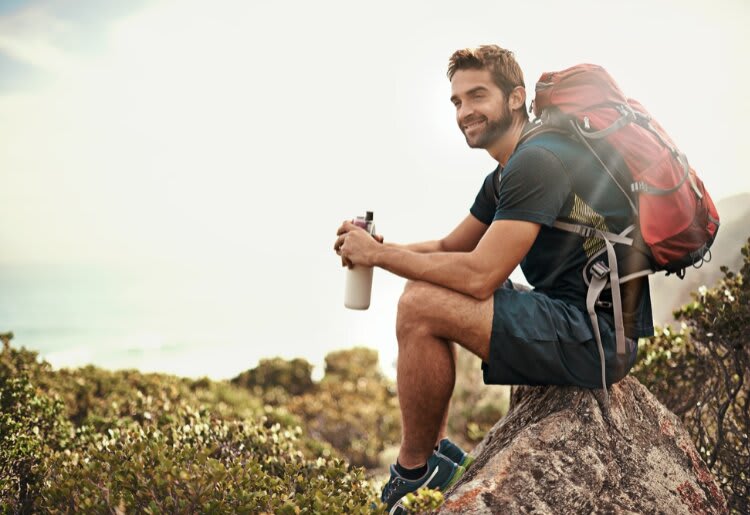Is Dry January really worth it?
In my years of offering in-person and online therapy, I've seen the positive impact of Dry January. It's more than just a month without alcohol; it's a journey towards better health and self-awareness.
With over 20 years of experience and a PsyD, I'm here to guide you through practical tips to help you successfully navigate going alcohol-free for 31 days. So, let's get started!
» Want to stick to your New Years Resolution? Check out these tips
Tips for a Successful Dry January
1. Commit to It
This is not the time for wishy-washy indecision about participating in Dry January. Make a firm decision to commit to it.
According to the book "How to Get People to Do Stuff," writing something down by hand strengthens our commitment.
Write out a contract for yourself: "I, [your name], commit to doing Dry January because I want to [list your reasons, like improving heart health, losing weight, etc.]"
Sign and date the contract, then place it somewhere you'll see it regularly to help you stay motivated and accountable throughout the month.
2. Enlist Support
Don't keep your Dry January goals a secret - tell your friends and family so they can support you. Research shows that strong social support leads to better health and higher well-being.
Check-in with them throughout the month to share your experience and progress. Knowing you have people in your corner cheering you on will help you stay motivated and accountable during your alcohol-free challenge.
Keep in mind that Dry January isn't for everyone. If you're showing signs of alcohol addiction, it's best to seek help from professionals like those at Talkspace.
3. Try an App
Consider trying an app for Dry January to track your progress and receive helpful tips. Here are some top-rated options:

4. Change Your Routine
If you used to meet friends at the bar for "thirsty Thursdays," change it up with a weekly coffee date, yoga class, home-cooked meal, hike, or local event. Try new healthy recipes and activities on weekends when you'd typically drink.
Join a running group or yoga studio to stay active. Alter your commute home to avoid temptation - stop at a juice bar instead of the liquor store. Filling your time with new hobbies and habits will make your alcohol-free month feel fresh and exciting.
» Feeling drained? Check out these 10 reasons you need to take time for yourself.
5. Explore Non-Alcoholic Treats
Try creating refreshing mocktails with unique ingredients like flavored syrups, herbs, spices, and fruit purees. Mix up virgin versions of your favorite cocktails to enjoy guilt-free. Stock up on interesting non-alcoholic beers, wines, and spirits to sample the range of NA options.
Turn tasting these products into a fun social activity by hosting friends for a booze-free happy hour. Take advantage of zero-proof drink menus popping up at many bars and restaurants.
6. Reward Yourself
Motivate yourself to stick to your alcohol-free Dry January goals by planning rewards. After one week without drinking, treat yourself to a massage or pedicure. Once you hit the halfway point, buy those new sneakers or headphones you've been eyeing.
If you make it to a full month without alcohol, celebrate with dinner at your favorite restaurant or tickets to a show you're excited about. Having these enticing incentives on the calendar will give you something to look forward to during your sober weeks.

7. Just Say No
Be prepared to decline drinks during Dry January by having a polite "no thanks" ready. When tempted with an impromptu happy hour or a cocktail at a party, don't hesitate to turn it down. Have a refreshing non-alcoholic beverage like sparkling water in hand as a backup.
If you find social settings with alcohol too challenging, don't be afraid to say no. Use that time alone to recharge and work on creative projects. Unexpected invites will come up, but don't let them sabotage your goals.
» Here's how some alone time can benefit your mental health.
8. Manage Your Stress Levels
Often, the temptation to unwind with a drink after a tough day can be strong. However, this period offers a perfect opportunity to explore alternative ways to handle stress. Useful tools include:
- Incorporating mindfulness practices and meditation.
- Trying yoga through dedicated apps or other forms of exercise.
- Simple deep breathing exercises to alleviate anxiousness.
- Journaling thoughts and feelings.
- Focusing on improving your spiritual wellness.
- Consider using online therapy platforms like BetterHelp and Cerebral for professional guidance in coping with stress.
9. Find New Ways to Have Fun
It's common for social activities to revolve around alcohol, but this month offers a perfect opportunity to break that pattern. Take a proactive approach by creating a list of exciting activities to replace your usual drinking habits. For example:
- Join a cooking class.
- Indulge in some friendly competition with a game of bowling or mini-golf.
- Explore the art and culture at a museum.
- Embrace the great outdoors with a hike.
- Host a board game night with friends.

10. Forgive the Setbacks
What happens if you only make it to January 3rd - or even the 2nd? Don't let a setback derail your Dry January goals. If you slip up, forgive yourself and get back on track. Make a plan for handling any stumbles along the way.
You can pick up the next day and continue with “Mostly Dry January." Or you can restart your 31 days of sobriety. Perfection is not required. What matters most is that you keep making an effort to meet your alcohol-free goals.
Why Do Dry January?
Dry January is popular because it's a great way to kick off the new year by taking a break from alcohol, helping you feel healthier and clearer mentally.
"There are a lot of benefits from taking a break from alcohol,” says Dr. George Koob, the director of the National Institute on Alcohol Abuse and Alcoholism, “If it's done wisely, it gives you a chance to evaluate your relationship with alcohol and cultivate other ways of relaxing and socializing coping."
Improve Your Physical Health
Taking a break from alcohol during Dry January can lead to significant health benefits, as observed in various studies. Participants often experience improved sleep, better concentration, and increased energy. Additionally, you might see a decrease in blood pressure and cholesterol levels, along with weight loss.
Even a short period of abstinence can make a noticeable difference to your overall physical health, including healthier skin and reduced liver fat.
Boost Your Mental Health
Alcohol is a depressant. It affects your brain's balance, increases stress hormones, and decreases mood-enhancing chemicals like serotonin.
It can disrupt your sleep, leading to mood swings, trouble focusing, memory issues, and even symptoms of anxiety or depression. By cutting alcohol, you'll have more energy, think clearer, have more stable emotions, and generally feel better.
Save Money
When you stop drinking, especially at popular bars and restaurants, the savings add up fast. According to Alcohol Change UK, 86% of people participating in Dry January save money.
Sobriety coach Casey McGuire Davidson experienced this herself; when she stopped drinking in 2016, she saved an extra $500 in just the first month. Over eight years, she estimates her savings at over $48,000.
Make the Most of Dry January in 2025
If you're trying Dry January for the first time—congratulations on taking this healthy challenge! Make sure you have clear motivations and commit fully to your plan. Enlist friends for support and celebrate your victories. If you slip up, get back on track.
With thoughtful preparation and self-forgiveness, you can make the most of your alcohol-free month. Remember, you deserve health and have the power to create positive change.
» Boost your mind with these 10 ways to stay mentally healthy.

